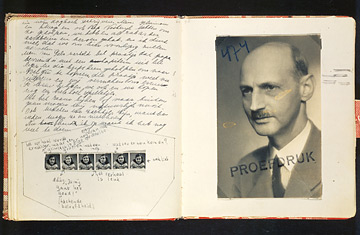
A page from the diary of Anne Frank, circa 1944, showing a photo of her father, Otto Frank, who survived three years of hiding in Amsterdam and his deportation to Auschwitz.
The until now undisclosed trove of documents include letters Otto Frank wrote between April 30, 1941 and Dec. 11, 1941 (when Germany declared war on the U.S.), as well as correspondence from his U.S. relatives and a university friend, New York's Nathan Straus Jr., the son of the Macy's department store's founder. The Franks began their two years in hiding in an attic above Otto Frank's office in July 1942.
The Otto Frank file measures at least half an inch thick, and page by page tells how the Franks tried desperately to escape from Nazi-occupied Holland. By the time Otto wrote his letters, the U.S. consulate in the Netherlands had closed, so he made attempts to arrange passage for his family to the United States or Cuba. He also explored possible escape routes through Spain that would ultimately lead to exit via neutral Portugal and sought visas to Paris.
The documents originally belonged to the New York City-based Hebrew Immigrant Aid Society, the country's oldest refugee resettlement agency. The organization transferred its archives (along with those inherited from agencies it merged or cooperated with) to the YIVO Institute for Jewish Research in stages from 1948 through 1974.
For the past year and a half, YIVO kept the letters' existence quiet while exploring the legal issues they raised—such as how they might affect matters of copyright, a major hurdle to their release since the Anne Frank legacy is guarded by various stakeholders, including the Anne Frank Foundation. Late Wednesday YIVO announced that it will declassify and release the documents at a Feb. 14 press conference.
Perhaps the most interesting question raised by the letters' release is why Otto Frank's letters and pleas were not answered in a way that he could save his family. YIVO executive director Carl Rheins believes the Frank file raises profound questions about U.S. immigration policy. Meanwhile, YIVO has enlisted "giants" of Holocaust studies to put the letters in context: American University professor Richard Breitman and David Engel, New York University's Maurice Greenberg Professor of Holocaust studies.
